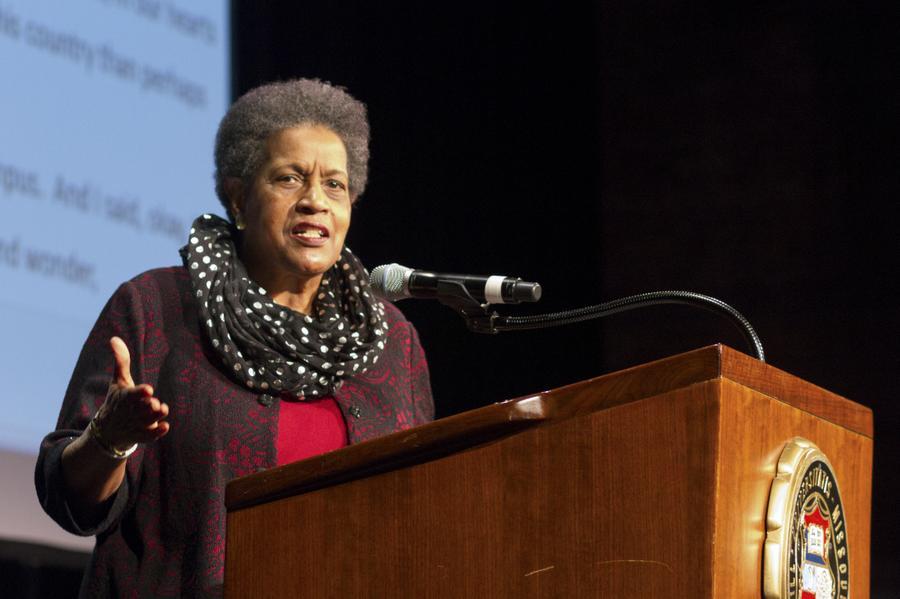Civil rights activist Myrlie Evers-Williams said she has been thinking about a night in 1962 every day since.
That night was when her home was firebombed and shortly after, her husband, fellow civil rights activist Medgar Evers was shot. It took about 30 years to convict his murderer, white supremacist Byron De La Beckwith.
The Missouri Theatre hosted Evers-Williams Wednesday night for a lecture, “Not Exactly What You Thought,” in commemoration of Martin Luther King Jr. Day last week.
Within her first minute of being on Missouri Theatre’s stage Wednesday night, civil rights activist Myrlie Evers-Williams asked if lights could better illuminate the audience. She did so not only because she prefers to see the audience she is speaking to, but primarily from a life lesson she learned long ago.
“In my background, darkness means hiding something,” Evers-Williams said. “It is hiding something that is more than likely waiting to attack you.”
The 81-year-old activist grew up in Mississippi. She attended Alcorn A&M College, where she met her husband, civil rights activist Medgar Evers.
Whenever Evers-Williams speaks, she said, she doesn’t write a script or plan out what to say in advance, but rather says what is on her mind that specific day.
While speaking to any audience is always a challenge, Evers-Williams said it is particularly so when she speaks to a younger group. She hopes that she is still able to communicate her message to a different generation, she said.
When Evers-Williams was a child, she said race was never discussed.
“You knew your place,” Evers-Williams said. “You stayed in your place . . . You never crossed the line.”
Now, Evers-Williams said, the younger generations are more willing to talk about racial topics, which she said is a step toward finding justice.
Another major difference of generations Evers-Williams said is the issue of physical violence.
In more recent years, this issue has, for the most part, gone away, Evers-Williams said. However, she said with the 2014 events of Ferguson and other high-profile killings, it appears as though the U.S. is returning to the violent aspects of the struggle.
“The tears, in a sense, have helped wash some of the brutality away, but then we were reawakened with Ferguson,” Evers-Williams said.
Freshman Erin Stark said Evers-Williams’ speech was inspiring. She said it’s important to know that history repeats itself.
“I just think it helps us remember how much people went through for our country,” Stark said.
Evers-Williams said she enjoys listening to the voices of younger generations about the issue of race, as she learns from their ideas. She said she doesn’t think Americans give young people enough credit for seeing deeply into the social issues that exist in America.
“I believe strongly that your generation will have more impact on the direction of this country in terms of race relations than anything else,” Evers-Williams said.
When Evers-Williams was a young bride, she once asked Medgar if they could take a break from their usual conversations about racial change and take a moment to talk about romantic topics.
She soon learned from him, she said, why him saying no was so important. She said she learned that no matter what, she should never take a break from obtaining basic freedoms every citizen deserves.
Evers-Williams said that even though her eyesight and hearing are slightly failing as she grows older, she is not through yet, nor should she be.
“Time passes quickly,” she said. “It passes quickly when you’re having fun. It passes even more quickly when you’re in the midst of a struggle for life, when you are in the midst of a struggle for dignity, when you are in the midst of a time hoping that you will one day see freedom.”
Evers-Williams said sometimes she feels as though she should buy a hoodie and walk through neighborhoods at night, just to see what would happen.
“I realize and you do too, and forget my grammar, but it ain’t over yet,” Evers-Williams said.
Reverend Raymond Hayes was also awarded during this event with the annual Dr. Martin Luther King, Jr. Service Award, presented by journalism professor Cynthia Frisby.
“You don’t have to be a great person, you just need to be surrounded by smart people,” Hayes said.
Senior Sam Roth, who attended the speech, said he hears about racial movements happening, but it’s impactful to hear about it from the direct source.
“I had no idea just what this woman had gone through and then her leadership roles with all these organizations,” Roth said. “It’s just amazing to find out about all the perseverance that has gone on. It’s obvious that so many advances have been made.”
The event was freshman Amber Letbetter’s first time going to the Missouri Theatre. She said she was inspired and motivated by Evers-Williams.
“I learned that whenever there is an injustice in our society or our community, I can’t get so angry that I want to be violent or that I feel like other people should be violent, but really hold a stand of nonviolence, strength and dignity,” Letbetter said.








